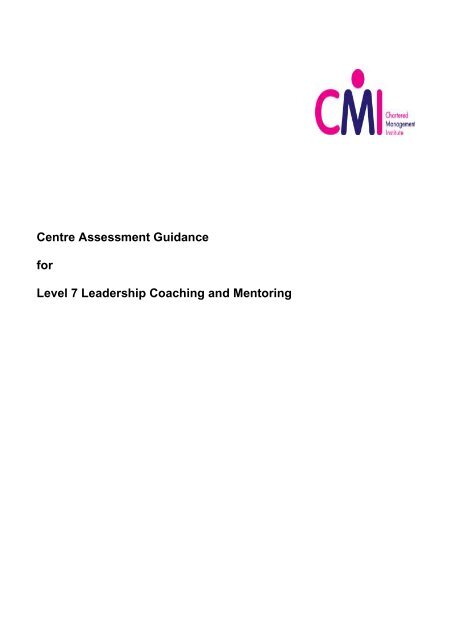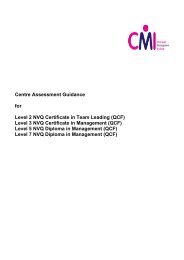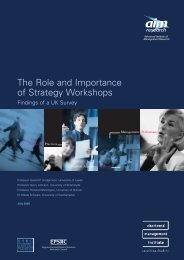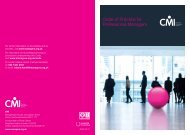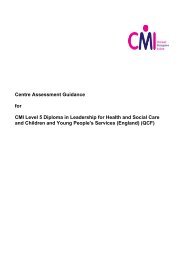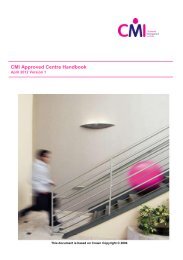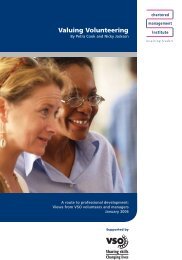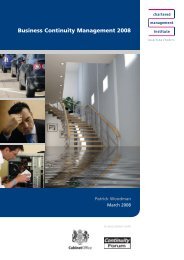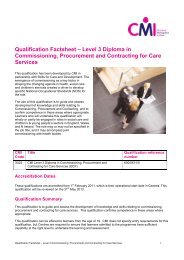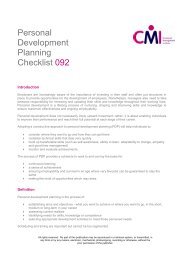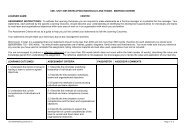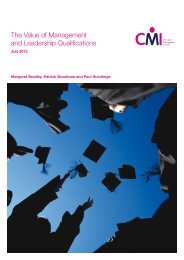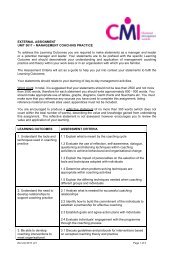Centre Assessment Guidance for Level 7 Leadership Coaching and ...
Centre Assessment Guidance for Level 7 Leadership Coaching and ...
Centre Assessment Guidance for Level 7 Leadership Coaching and ...
You also want an ePaper? Increase the reach of your titles
YUMPU automatically turns print PDFs into web optimized ePapers that Google loves.
<strong>Centre</strong> <strong>Assessment</strong> <strong>Guidance</strong><strong>for</strong><strong>Level</strong> 7 <strong>Leadership</strong> <strong>Coaching</strong> <strong>and</strong> Mentoring
<strong>Leadership</strong> <strong>Coaching</strong> <strong>and</strong> Mentoring <strong>Centre</strong> <strong>Assessment</strong> <strong>Guidance</strong>ContentsPageIntroduction 3About these qualificationsTitles <strong>and</strong> qualifications reference numbers 3Accreditation dates 3Qualifications summary 3Progressions 3Credit values <strong>and</strong> rules of combination <strong>for</strong> the qualifications 4Relationship to the National Occupational St<strong>and</strong>ards <strong>for</strong> Management <strong>and</strong> <strong>Leadership</strong> 5<strong>Assessment</strong> <strong>and</strong> Verification 6What is expected of the learner? 6External <strong>Assessment</strong> 7Recognition of Prior Learning <strong>and</strong> achievement 8Support <strong>for</strong> <strong>Centre</strong>s 8Units 8Unit 7002 Strategic per<strong>for</strong>mance management 9Unit 7010 Organisational change 10Unit 7015 <strong>Coaching</strong> <strong>and</strong> mentoring within organisational culture 11Unit 7016 <strong>Coaching</strong> <strong>and</strong> mentoring policies 12Unit 7017 Organisational coaching <strong>and</strong> mentoring 13Unit 7018 Strategic impact of coaching <strong>and</strong> mentoring 14Unit 7019 <strong>Coaching</strong> <strong>and</strong> mentoring <strong>and</strong> organisational direction 15Unit 7020 <strong>Leadership</strong> coaching <strong>and</strong> mentoring skills 16Unit 6001 Managing organisational culture 17Unit 6004 Leading equality <strong>and</strong> diversity 1827/04/2010 2
<strong>Leadership</strong> <strong>Coaching</strong> <strong>and</strong> Mentoring <strong>Centre</strong> <strong>Assessment</strong> <strong>Guidance</strong>IntroductionThis document aims to support CMI <strong>Centre</strong>s in the delivery, assessment <strong>and</strong> verification of the <strong>Level</strong> 7Qualifications in <strong>Leadership</strong> <strong>Coaching</strong> <strong>and</strong> Mentoring. It should be used in conjunction with the CMI <strong>Centre</strong> Codeof Practice.About these qualificationsTitles <strong>and</strong> qualifications reference numbersThe titles given below are the titles as they will appear on the qualification when awarded to the learner. Thequalification reference number is the number allocated to the qualification by the Regulator at the time ofaccreditation, which confirms that this is a fundable qualification on the QCF. The CMI code is the code whichshould be used when registering learners with CMI. Each unit also has a unique QCA unit number – this appearswith the content of each unit at the end of this document.CMICodeTitleQualificationreferencenumber7A2 CMI <strong>Level</strong> 7 Award in <strong>Leadership</strong> <strong>Coaching</strong> <strong>and</strong> Mentoring (QCF) 500/7334/57C2 CMI <strong>Level</strong> 7 Certificate in <strong>Leadership</strong> <strong>Coaching</strong> <strong>and</strong> Mentoring (QCF) 500/7335/77D2 CMI <strong>Level</strong> 7 Diploma in <strong>Leadership</strong> <strong>Coaching</strong> <strong>and</strong> Mentoring (QCF) 500/7336/9Accreditation datesThese qualifications are accredited from 1 September 2009, which is their operational start date in <strong>Centre</strong>s. Theaccreditation ends on 31 December 2013, <strong>and</strong> the final date <strong>for</strong> certification is 31 December 2016.Qualifications summaryThese qualifications are designed <strong>for</strong> managers <strong>and</strong> leaders who have the authority <strong>and</strong> responsibility <strong>for</strong>developing <strong>and</strong> implementing a coaching <strong>and</strong> mentoring strategy across the organisation. The qualificationsrequire managers <strong>and</strong> leaders to build on their strategic management <strong>and</strong> leadership skills <strong>and</strong> to focus on therequirements of embedding the organisation’s strategy.Although the qualifications can be offered to learners from age 18, in practice the majority of learners at this levelwould be expected to be over 19. CMI not specify entry requirements <strong>for</strong> these qualifications, but <strong>Centre</strong>s arerequired to ensure that learners admitted to the programme have sufficient capability at the right level toundertake the learning <strong>and</strong> assessment.The qualification is offered in the medium of the English Language. The qualification can be offered by <strong>Centre</strong>sin languages other than English – <strong>Centre</strong>s wishing to do this should refer to the relevant section of the CMI<strong>Centre</strong> Code of Practice <strong>for</strong> guidance.ProgressionsThe qualifications provide opportunities <strong>for</strong> progression to other qualifications at the same or higher levels, whichcould also be work-based or more academically structured. The qualifications also support learners in meetingthe requirements <strong>for</strong> work <strong>and</strong>/or employment within all areas of management <strong>and</strong> leadership at this level.27/04/2010 3
<strong>Leadership</strong> <strong>Coaching</strong> <strong>and</strong> Mentoring <strong>Centre</strong> <strong>Assessment</strong> <strong>Guidance</strong>Credit values <strong>and</strong> rules of combination <strong>for</strong> the qualificationsA credit value specifies the number of credits that will be awarded to a learner who has achieved the learningoutcomes of the unit. The credit value of the unit will remain constant in all contexts, regardless of theassessment method used or the qualification(s) to which it contributes. Learners will only be awarded credits <strong>for</strong>the successful completion of whole units. (One credit is awarded <strong>for</strong> those learning outcomes achievable in 10hours of learning time).Learning time is a notional measure of the amount of time a typical learner might be expected to take tocomplete all of the learning relevant to achievement of the learning outcomes in a given unit. Learning timeincludes activities such as directed study, assessment, tutorials, mentoring <strong>and</strong> individual private study.Guided learning hours, however, are intended to relate only to facilitated learning <strong>and</strong> associated assessments –individual private study is not included – <strong>and</strong> give guidance to delivery <strong>Centre</strong>s on the amount of resourceneeded to deliver the programme <strong>and</strong> support learners. The units, guided learning hours <strong>and</strong> rules ofcombination <strong>for</strong> these qualifications are given in the tables 1 <strong>and</strong> 2.Table 1 – Units <strong>and</strong> rules of combination <strong>for</strong> <strong>Level</strong> 7 Award <strong>and</strong> CertificateUnits Credits GLHUnit 7015 <strong>Coaching</strong> <strong>and</strong> mentoring within organisational culture 7 30Unit 7016 <strong>Coaching</strong> <strong>and</strong> mentoring policies 6 25Unit 7017 Organisational coaching <strong>and</strong> mentoring 6 25Unit 7018 Strategic impact of coaching <strong>and</strong> mentoring 6 30Unit 7019 <strong>Coaching</strong> <strong>and</strong> mentoring <strong>and</strong> organisational direction 7 30Unit 7020 <strong>Leadership</strong> coaching <strong>and</strong> mentoring skills 7 30Award – Learners need to complete any combination of units to a minimum of 6 credits to achieve thequalification. Range of guided learning hours: 25 - 30Certificate - Learners need to complete any combination of units to a minimum of 13 credits to achieve thequalification. Range of guided learning hours: 55 - 6027/04/2010 4
<strong>Leadership</strong> <strong>Coaching</strong> <strong>and</strong> Mentoring <strong>Centre</strong> <strong>Assessment</strong> <strong>Guidance</strong>Table 2 – Units <strong>and</strong> rules of combination <strong>for</strong> <strong>Level</strong> 7 DiplomaUnits Credits GLHGroup AUnit 7015 <strong>Coaching</strong> <strong>and</strong> mentoring within organisational culture 7 30Unit 7016 <strong>Coaching</strong> <strong>and</strong> mentoring policies 6 25Unit 7017 Organisational coaching <strong>and</strong> mentoring 6 25Unit 7018 Strategic impact of coaching <strong>and</strong> mentoring 6 30Unit 7002 Strategic per<strong>for</strong>mance management 7 25Unit 7020 <strong>Leadership</strong> coaching <strong>and</strong> mentoring skills 7 30Group BUnit 7019 <strong>Coaching</strong> <strong>and</strong> mentoring <strong>and</strong> organisational direction 7 30Unit 7010 Organisational change 7 25Unit 6001 Managing organisational culture 7 30Unit 6004 Leading equality <strong>and</strong> diversity 7 30Diploma - Learners need to complete all core units (Group A) <strong>and</strong> two optional units (Group B) to a total of atleast 53 credits to achieve the qualification. Range of guided learning hours: 220 - 220Relationship to National Occupational St<strong>and</strong>ards <strong>for</strong> Management <strong>and</strong> <strong>Leadership</strong>The relationship of each unit to the Management <strong>and</strong> <strong>Leadership</strong> NOS is shown in table 3:Table 3 – Relationship to Management <strong>and</strong> <strong>Leadership</strong> NOSUnitsNOS UnitsUnit 7015 <strong>Coaching</strong> <strong>and</strong> mentoring within organisational culture A3, B2, B3, C3, C4, C5, D4, D7Unit 7016 <strong>Coaching</strong> <strong>and</strong> mentoring policies B3, B4, B7, B9, C3, C6,, D2, D7Unit 7017 Organisational coaching <strong>and</strong> mentoring B3, B4, B7, B9, C4, C5, C6, D2, D7Unit 7018 Strategic impact of coaching <strong>and</strong> mentoring B4, B8, B10, C3, D4, D7Unit 7019 <strong>Coaching</strong> <strong>and</strong> mentoring <strong>and</strong> organisational direction B2, B9, B10, C4, C5, D7Unit 7002 Strategic per<strong>for</strong>mance management D2, D4, F3, F12Unit 7010 Organisational change A3, B2, B8, E4, E5, E7, F9, F12Unit 7020 <strong>Leadership</strong> coaching <strong>and</strong> mentoring skills B5, B6, B7, D7Unit 6001 Managing organisational culture B9, C4Unit 6004 Leading equality <strong>and</strong> diversity B11, B1227/04/2010 5
<strong>Leadership</strong> <strong>Coaching</strong> <strong>and</strong> Mentoring <strong>Centre</strong> <strong>Assessment</strong> <strong>Guidance</strong><strong>Assessment</strong> <strong>and</strong> verificationThe main objective of the assessment of these qualifications will be to meet the assessment criteria detailedwithin each unit.The primary interface with the learner is the Assessor whose job it is to assess the evidence presented by thelearner. The Assessor should provide an audit trail showing how the judgement of the learner’s overallachievement has been arrived at.The <strong>Centre</strong>’s assessment plan, to be agreed with the external verifier, should include a matrix <strong>for</strong> eachqualification showing how each unit is to be assessed against the relevant criteria <strong>and</strong> which specific piece orpieces of work will be identified in relation to each unit. It should also show how assessment is scheduled intothe delivery programme.In designing the individual tasks <strong>and</strong> activities, centres must ensure that:• the selected assessment task/activity is relevant to the content of the unit• there are clear instructions given to learners as to what is expected• learners are clearly told how long the assessment will take (if it is a timed activity), <strong>and</strong> what reference orother material they may use (if any) to complete it• the language used in the assessment is free from any bias• the language <strong>and</strong> technical terms used are at the appropriate level <strong>for</strong> the learnersIn addition to the specific assessment criteria in each unit, the learner’s work must be:• accurate, current <strong>and</strong> authentic• relevant in depth <strong>and</strong> breadth<strong>and</strong> must also show the learner’s:• clear grasp of concepts• ability to link theory to practice, <strong>and</strong>• ability to communicate clearly in the relevant discipline at the expected level <strong>for</strong> the qualificationThere is no grading <strong>for</strong> CMI qualifications, <strong>and</strong> external verification of learners’ work only confirms that therequired criteria <strong>for</strong> achievement have been met. <strong>Centre</strong>s are, however, free to apply their own grade scales, butit must be understood that these are completely separate from the CMI qualification.What is expected of the learner?It is important to ensure consistency of assessment, <strong>and</strong> that dem<strong>and</strong>s made on learners are comparable within<strong>and</strong> between centres. A number of assessment methods can be used. <strong>Centre</strong>s are encouraged to use a rangeof methods to ensure that all the learning outcomes <strong>and</strong> assessment criteria are met, <strong>and</strong> to enhance learners’development.27/04/2010 6
<strong>Leadership</strong> <strong>Coaching</strong> <strong>and</strong> Mentoring <strong>Centre</strong> <strong>Assessment</strong> <strong>Guidance</strong><strong>Assessment</strong> methods can include:• case studies• role play• time constrained tests• examinations• assignments• reports• integrated work activities• viva voce• projects• presentationsIn some instances, as well as written work, use can be made of technology. It is important, however, to ensuresufficient traceability <strong>for</strong> assessment <strong>and</strong> verification.The written word, however generated <strong>and</strong> recorded, is still expected to <strong>for</strong>m the majority of assessable workproduced by learners at <strong>Level</strong> 7. The amount <strong>and</strong> volume of work <strong>for</strong> each unit at this level should be broadlycomparable to a word count of 3000 - 3500 words.<strong>Centre</strong>s <strong>and</strong> learners are encouraged to use methods of presenting data, analysis <strong>and</strong> in<strong>for</strong>mation other thanstraight<strong>for</strong>ward narrative text. In the appropriate contexts, tables, graphs, pie charts, diagrams <strong>and</strong> illustrationsare just as dem<strong>and</strong>ing on the learner.External <strong>Assessment</strong>There is no regulatory requirement <strong>for</strong> external assessment. However, CMI offers an additional service ofexternal assessment to centres, who wish to use CMI devised assignments as part of their programme. Furtherin<strong>for</strong>mation on this service <strong>and</strong> the units <strong>for</strong> which it is available appears on the websitewww.managers.org.uk/qualifications/hub/centre resources27/04/2010 7
<strong>Leadership</strong> <strong>Coaching</strong> <strong>and</strong> Mentoring <strong>Centre</strong> <strong>Assessment</strong> <strong>Guidance</strong>Recognition of Prior Learning <strong>and</strong> AchievementThe Qualifications <strong>and</strong> Credit framework is based on the principle of credit accumulation <strong>and</strong> transfer. Withinthis suite of qualifications, learners have the opportunity to build their achievements from a single unit into a fullDiploma. CMI will publish on its website which units <strong>and</strong> qualifications from other Awarding Bodies can berecognised <strong>for</strong> credit transfer <strong>and</strong> exemption. Credit transfer in the QCF will be based on confirmation ofachievement of QCF numbered units.There will of course still be instances where learners will wish to claim recognition of prior learning which hasnot been <strong>for</strong>mally assessed <strong>and</strong> accredited. In those instances, <strong>Centre</strong>s are free, after discussion <strong>and</strong>agreement with their External Verifier, to allow these learners direct access to the relevant assessment <strong>for</strong> theunit, without unnecessary repetition of learning. Details of the process <strong>for</strong> recording such RPL (Recognition ofPrior Learning) are included in the CMI <strong>Centre</strong> Code of Practice.Support <strong>for</strong> <strong>Centre</strong>sStaff at Approved <strong>Centre</strong>s are offered group membership of CMI, enabling them to access all the support <strong>and</strong>in<strong>for</strong>mation available to their learners. More in<strong>for</strong>mation about what is available is detailed in the CMI <strong>Centre</strong>Code of Practice, <strong>and</strong> via the website www.managers.org.uk/qualificationsUnitsThe content of the units <strong>for</strong> the <strong>Level</strong> 7 suite of qualifications follow.Accessing the units via the CMI website will enable <strong>Centre</strong>s also to access support <strong>and</strong> reading material fromthe Study Resource <strong>Centre</strong>.27/04/2010 8
<strong>Leadership</strong> <strong>Coaching</strong> <strong>and</strong> Mentoring <strong>Centre</strong> <strong>Assessment</strong> <strong>Guidance</strong>Title:Unit aim:Strategic per<strong>for</strong>mance managementThis unit is about ensuring that the per<strong>for</strong>mance of the team contributes tomeeting strategic objectives.<strong>Level</strong>: 7 Unit Number: 7002 QCA UnitNumberF/501/5018Credit value: 7 Guided LearningHours25Learning outcomesThe learner will:1. Be able to set per<strong>for</strong>mancetargets of teams to meet strategicobjectives<strong>Assessment</strong> criteriaThe learner can:1.1 Assess the links between team per<strong>for</strong>mance <strong>and</strong> strategicobjectives1.2 Evaluate tools <strong>and</strong> techniques available to set teamper<strong>for</strong>mance targets1.3 Assess the value of team per<strong>for</strong>mance tools to measurefuture team per<strong>for</strong>mance2. Be able to agree teamper<strong>for</strong>mance targets to contributeto meeting strategic objectives2.1 Analyse how to determine required per<strong>for</strong>mance targetswithin teams against current per<strong>for</strong>mance2.2 Discuss the need to encourage individual commitment toteam per<strong>for</strong>mance in achievement of organisational objectives2.3 Relate the application of delegation, mentoring <strong>and</strong> coachingto the achievement of the organisational objectives2.4 Evaluate a team per<strong>for</strong>mance plan to meet organisationalobjectives3. Be able to monitor actions <strong>and</strong>activities defined to improve teamper<strong>for</strong>mance3.1 Assess the process <strong>for</strong> monitoring team per<strong>for</strong>mance <strong>and</strong>initiate changes where necessary3.2 Evaluate team per<strong>for</strong>mance against agreed objectives of theplan3.3 Evaluate the impact of the team per<strong>for</strong>mance in contributingto meeting strategic objectives4. Be able to apply influencing <strong>and</strong>persuading skills, to the dynamics<strong>and</strong> politics of personal interactions4.1 Determine influencing <strong>and</strong> persuading methodologies to gainthe commitment of individuals to a course of action4.2 Discuss the impact of individual dynamics, interests <strong>and</strong>organisational politics on securing the commitment of individualsto a course of action27/04/2010 9
<strong>Leadership</strong> <strong>Coaching</strong> <strong>and</strong> Mentoring <strong>Centre</strong> <strong>Assessment</strong> <strong>Guidance</strong>Title:Unit aim:Organisational changeThis unit is about identifying <strong>and</strong> developing change strategies to meetorganisational objectives.<strong>Level</strong>: 7 Unit Number: 7010 QCA UnitNumberH/501/5027Credit value: 7 Guided LearningHours25Learning outcomesThe learner will:1. Underst<strong>and</strong> how to applysolutions to organisational change<strong>Assessment</strong> criteriaThe learner can:1.1 Identify a range of organisational change, models orframeworks1.2 Apply a range of creative problem solving techniques toaddress change challenges1.3 Identify <strong>and</strong> justify change solutions that link toorganisational strategic plans2. Underst<strong>and</strong> how to develop achange strategy usingimplementation models2.1 Evaluate a range of change implementation models2.2 Identify the criteria to select a change implementation modelthat supports organisational change3. Be able to analyse anorganisational response to change3.1 Demonstrate the use of analytical tools to monitor theprogress <strong>and</strong> the effect of change3.2 Assess monitoring <strong>and</strong> measurement techniques to changewithin an organisation3.3 Analyse strategies to minimise adverse effects of change4. Underst<strong>and</strong> how to evaluate theimpact of change strategies4.1 Identify the processes to review the impact of the change4.2 Analyse the results of the impact review4.3 Present the findings of the change analysis27/04/2010 10
<strong>Leadership</strong> <strong>Coaching</strong> <strong>and</strong> Mentoring <strong>Centre</strong> <strong>Assessment</strong> <strong>Guidance</strong>Title:Unit aim:<strong>Coaching</strong> <strong>and</strong> mentoring within organisational cultureThis unit is about linking coaching <strong>and</strong> mentoring to strategic per<strong>for</strong>manceobjectives, the impact of culture on coaching <strong>and</strong> mentoring <strong>and</strong> the impact ofcoaching <strong>and</strong> mentoring on culture.<strong>Level</strong>: 7 Unit Number: 7015 QCA UnitNumberT/600/3507Credit value: 7 Guided LearningHours30Learning outcomesThe learner will:1. Be able to underst<strong>and</strong> the linksbetween strategic per<strong>for</strong>mance<strong>and</strong> coaching <strong>and</strong> mentoring<strong>Assessment</strong> criteriaThe learner can:1.1 Evaluate the links between individual, team <strong>and</strong>departmental per<strong>for</strong>mance objectives <strong>and</strong> organisationalstrategic per<strong>for</strong>mance objectives1.2 Demonstrate the relationship between individual, team <strong>and</strong>departmental per<strong>for</strong>mance development <strong>and</strong> coaching <strong>and</strong>mentoring1.3 Develop a case that coaching <strong>and</strong> mentoring can benefitorganisational strategic per<strong>for</strong>mance objectives throughindividual, team <strong>and</strong> departmental per<strong>for</strong>mance development1.4 Conduct a cost/benefit analysis of a coaching <strong>and</strong> mentoringprocess to support achievement of organisational strategicper<strong>for</strong>mance objectives2. Be able to underst<strong>and</strong> theimpact of organisational culture oncoaching <strong>and</strong> mentoring2.1 Determine how organisational culture can impact oncoaching <strong>and</strong> mentoring2.2 Evaluate the current cultural influences that may inhibitcoaching <strong>and</strong> mentoring2.3 Evaluate the current cultural influences that may supportcoaching <strong>and</strong> mentoring3. Be able to underst<strong>and</strong> howcoaching <strong>and</strong> mentoring canimpact organisational culture3.1 Discuss the use of coaching <strong>and</strong> mentoring to contributetowards per<strong>for</strong>mance management3.2 Determine the need <strong>for</strong> board level endorsement of coaching<strong>and</strong> mentoring3.3 Determine how coaching <strong>and</strong> mentoring can support a rangeof development issues3.4 Evaluate the effect of coaching <strong>and</strong> mentoring onorganisational culture27/04/2010 11
<strong>Leadership</strong> <strong>Coaching</strong> <strong>and</strong> Mentoring <strong>Centre</strong> <strong>Assessment</strong> <strong>Guidance</strong>Title:Unit aim:<strong>Coaching</strong> <strong>and</strong> mentoring policiesThis unit is about constructing a coaching <strong>and</strong> mentoring policy <strong>and</strong> gainingpolicy acceptance throughout the organisation.<strong>Level</strong>: 7 Unit Number: 7016 QCA UnitNumberF/600/3509Credit value: 6 Guided LearningHours25Learning outcomesThe learner will:1. Be able to constructorganisational coaching <strong>and</strong>mentoring policies<strong>Assessment</strong> criteriaThe learner can:1.1 Demonstrate that coaching <strong>and</strong> mentoring is a businessdriver linking individual <strong>and</strong> strategic per<strong>for</strong>mance1.2 Devise a methodology to identify individual operationalresponsibilities to lead on coaching <strong>and</strong> mentoring1.3 Evaluate how managers can be measured on the effects oftheir coaching <strong>and</strong> mentoring1.4 Develop ethical guidelines to be used in all coaching <strong>and</strong>mentoring activities1.5 Construct a policy that offers coaching <strong>and</strong> mentoring <strong>for</strong> allstaff during their employment life cycle2. Be able to underst<strong>and</strong> theacceptance of coaching <strong>and</strong>mentoring policies in theorganisation2.1 Demonstrate how coaching <strong>and</strong> mentoring is used tocontribute to the per<strong>for</strong>mance of all in the organisation2.2 Determine the support, internal <strong>and</strong> external, available <strong>for</strong>coaching <strong>and</strong> mentoring activities2.3 Determine how coaches <strong>and</strong> mentors can be recognised <strong>for</strong>their contribution to the per<strong>for</strong>mance of others27/04/2010 12
<strong>Leadership</strong> <strong>Coaching</strong> <strong>and</strong> Mentoring <strong>Centre</strong> <strong>Assessment</strong> <strong>Guidance</strong>Title:Unit aim:Organisational coaching <strong>and</strong> mentoringThis unit is about initiating organisational coaching <strong>and</strong> mentoring, dealing withchanges, <strong>and</strong> the provision of on-going high level support.<strong>Level</strong>: 7 Unit Number: 7017 QCA UnitNumberT/600/3510Credit value: 6 Guided LearningHours25Learning outcomesThe learner will:1. Be able to underst<strong>and</strong> theissues involved during the adoptionof organisational coaching <strong>and</strong>mentoring<strong>Assessment</strong> criteriaThe learner can:1.1 Evaluate obstacles to coaching <strong>and</strong> mentoring from theoperational managers’ perspective1.2 Devise strategies to overcome or minimise the operationalmanagers’ issues1.3 Analyse those operational areas requiring additional supportduring adoption of coaching <strong>and</strong> mentoring2. Be able to underst<strong>and</strong> changesoccurring through the coaching<strong>and</strong> mentoring process2.1 Devise a strategy to monitor <strong>and</strong> review the impact ofcoaching <strong>and</strong> mentoring across the organisation2.2 Develop a methodology <strong>for</strong> operational managers whounder-per<strong>for</strong>m in coaching <strong>and</strong> mentoring2.3 Develop a methodology <strong>for</strong> operational managers who overper<strong>for</strong>min coaching <strong>and</strong> mentoring3. Be able to underst<strong>and</strong> the need<strong>for</strong> continual high level support <strong>for</strong>coaching <strong>and</strong> mentoring3.1 Determine a method to identify <strong>and</strong> recognise coaching <strong>and</strong>mentoring successes3.2 Evaluate a strategy in response to a less than positivecoaching <strong>and</strong> mentoring experience3.3 Discuss methods <strong>for</strong> the strategic managers to demonstrateovert support <strong>for</strong> the coaching <strong>and</strong> mentoring process27/04/2010 13
<strong>Leadership</strong> <strong>Coaching</strong> <strong>and</strong> Mentoring <strong>Centre</strong> <strong>Assessment</strong> <strong>Guidance</strong>Title:Unit aim:Strategic impact of coaching <strong>and</strong> mentoringThis unit is about evaluating individual, team <strong>and</strong> departmental development fromcoaching <strong>and</strong> mentoring, <strong>and</strong> its impact on strategic per<strong>for</strong>mance objectives.<strong>Level</strong>: 7 Unit Number: 7018 QCA UnitNumberJ/600/3513Credit value: 6 Guided LearningHours30Learning outcomesThe learner will:1. Be able to underst<strong>and</strong> individual,team <strong>and</strong> departmentaldevelopment from the coaching<strong>and</strong> mentoring process<strong>Assessment</strong> criteriaThe learner can:1.1 Analyse changes to culture within the organisation1.2 Determine how coaching <strong>and</strong> mentoring is used to manageindividuals, teams <strong>and</strong> departments1.3 Evaluate how coaching <strong>and</strong> mentoring is used to shareknowledge between individuals, teams <strong>and</strong> departments2. Be able to underst<strong>and</strong> the effectof coaching <strong>and</strong> mentoring onstrategic per<strong>for</strong>mance objectives2.1 Discuss measures to identify the impact of coaching <strong>and</strong>mentoring on strategic per<strong>for</strong>mance objectives2.2 Evaluate the costs of the coaching <strong>and</strong> mentoring processagainst the benefits obtained2.3 Devise a method to share the evaluation of the coaching <strong>and</strong>mentoring across the organisation27/04/2010 14
<strong>Leadership</strong> <strong>Coaching</strong> <strong>and</strong> Mentoring <strong>Centre</strong> <strong>Assessment</strong> <strong>Guidance</strong>Title:Unit aim:<strong>Coaching</strong> <strong>and</strong> mentoring <strong>and</strong> organisational directionThis unit is about embedding coaching <strong>and</strong> mentoring in the organisation,through individual development aligned to evolving organisational objectives <strong>and</strong>direction.<strong>Level</strong>: 7 Unit Number: 7019 QCA UnitNumberR/600/3515Credit value: 7 Guided LearningHours30Learning outcomesThe learner will:1. Be able to develop coaching <strong>and</strong>mentoring <strong>for</strong> individuals <strong>and</strong>organisations<strong>Assessment</strong> criteriaThe learner can:1.1 Develop autonomous coaching <strong>and</strong> mentoring networkswithin the organisation1.2 Implement the organisational coaching <strong>and</strong> mentoring policy1.3 Identify external coaches <strong>and</strong> mentors that can supportinternal coaches <strong>and</strong> mentors1.4 Evaluate accreditation <strong>and</strong> Continuing ProfessionalDevelopment opportunities <strong>for</strong> coaches <strong>and</strong> mentors2. Be able to underst<strong>and</strong> howcoaching <strong>and</strong> mentoring cansupport evolving organisationalobjectives2.1 Analyse organisational opportunities that can be exploitedthrough coaching <strong>and</strong> mentoring2.2 Devise a knowledge sharing network to operate upwards,downwards <strong>and</strong> between peers2.3 Develop a culture that encourages staff to seek coaching<strong>and</strong> mentoring from customers, suppliers <strong>and</strong> externalbenchmarks2.4 Identify <strong>and</strong> promote the core business drivers <strong>and</strong>achievements to justify the coaching <strong>and</strong> mentoring investment27/04/2010 15
<strong>Leadership</strong> <strong>Coaching</strong> <strong>and</strong> Mentoring <strong>Centre</strong> <strong>Assessment</strong> <strong>Guidance</strong>Title:Unit aim:<strong>Leadership</strong> coaching <strong>and</strong> mentoring skillsThis unit is about developing skills <strong>and</strong> practices that support coaching <strong>and</strong>mentoring activities across the organisation.<strong>Level</strong>: 7 Unit Number: 7020 QCA UnitNumberY/600/3516Credit value: 7 Guided LearningHours30Learning outcomesThe learner will:1. Underst<strong>and</strong> how coaching <strong>and</strong>mentoring programmes supportbusiness objectives<strong>Assessment</strong> criteriaThe learner can:1.1 Evaluate the benefits of coaching <strong>and</strong> mentoring to anorganisation1.2 Assess how coaching <strong>and</strong> mentoring programmes supportbusiness objectives1.3 Develop guidelines <strong>and</strong> protocols <strong>for</strong> programmes based onaccepted coaching <strong>and</strong> mentoring theory <strong>and</strong> practice1.4 Develop a coherent, congruent statement of ethics <strong>for</strong>coaching <strong>and</strong> mentoring programmes <strong>and</strong> activities across theorganisation2. Be able to plan theimplementation of coaching <strong>and</strong>mentoring to achieveorganisational objectives2.1 Discuss the organisational <strong>and</strong> resource implications ofcoaching <strong>and</strong> mentoring2.2 Explain how to overcome organisational <strong>and</strong> individualresistance to the implementation of coaching <strong>and</strong> mentoring2.3 Evaluate the impact to an organisation of establishingcoaching <strong>and</strong> mentoring culture2.4 Devise an implementation plan to install coaching <strong>and</strong>mentoring programmes within an organisation3. Be able to develop skills as aleader in coaching <strong>and</strong> mentoring3.1 Assess current skills of communication <strong>and</strong> peopledevelopment to support personal practice of coaching <strong>and</strong>mentoring3.2 Identify development opportunities to meet personal skillsneeds <strong>and</strong> to develop own practice3.3 Evaluate skills <strong>and</strong> practices <strong>and</strong> produce a personaldevelopment plan in relation to coaching <strong>and</strong> mentoring skills27/04/2010 16
<strong>Leadership</strong> <strong>Coaching</strong> <strong>and</strong> Mentoring <strong>Centre</strong> <strong>Assessment</strong> <strong>Guidance</strong>Title:Unit aim:Managing organisational cultureThis unit is about organisational culture, its impact on strategy, per<strong>for</strong>mance <strong>and</strong> thedevelopment of appropriate cultures; it also addresses national cultural difference.<strong>Level</strong>: 6 Unit Number: 6001 QCA UnitNumberH/502/2172Credit value: 7 Guided LearningHours30Learning outcomesThe learner will:<strong>Assessment</strong> criteriaThe learner can:1. Be able to underst<strong>and</strong> howorganisational culture can impacton organisational behaviour1.1 Analyse the concept of culture to organisations1.2 Compare the traits of power culture, role culture, task culture <strong>and</strong>person culture1.3 Evaluate internal <strong>and</strong> external factors that could influenceorganisational culture, including national cultures2. Be able to underst<strong>and</strong> therelationship betweenorganisational culture, strategy <strong>and</strong>per<strong>for</strong>mance2.1 Identify values <strong>and</strong> cultures that encourage behaviours consistentwith organisational strategy2.2 Evaluate personal managerial behaviours that rein<strong>for</strong>ceorganisational values <strong>and</strong> cultures2.3 Communicate organisational values to the organisation thatmotivate the organisation to apply these values3. Be able to underst<strong>and</strong> the skillsof cultural development3.1 Discuss the tools available to an organisation to identify <strong>and</strong>develop its culture3.2 Devise methods of dealing with messages <strong>and</strong> behaviours whichare in conflict with organisational values3.3 Determine legitimate strategies <strong>and</strong> tactics to influence people insupport of organisational values3.4 Evaluate how national differences <strong>and</strong> cultures can impact ontransferability of organisational structures, systems <strong>and</strong> processes27/04/2010 17
<strong>Leadership</strong> <strong>Coaching</strong> <strong>and</strong> Mentoring <strong>Centre</strong> <strong>Assessment</strong> <strong>Guidance</strong>Title:Leading equality <strong>and</strong> diversityUnit aim:This unit is about organisational commitment to equality <strong>and</strong> diversity, <strong>and</strong> itsapplication <strong>and</strong> support throughout the organisation.<strong>Level</strong>: 6 Unit Number: 6004 QCA UnitNumberT/502/2175Credit value: 7 Guided LearningHours30Learning outcomesThe learner will:<strong>Assessment</strong> criteriaThe learner can:1. Be able to underst<strong>and</strong> thecommitment to equality ofopportunity <strong>and</strong> diversity1.1 Evaluate the organisation’s commitment to equality of opportunity<strong>and</strong> diversity1.2 Discuss how behaviour, actions <strong>and</strong> words, of all members of theorganisation, support the commitment to equality of opportunity <strong>and</strong>diversity1.3 Identify organisational <strong>and</strong> personal responsibilities <strong>and</strong> liabilitiesunder equality legislation <strong>and</strong>/or codes of practice2. Be able to underst<strong>and</strong> theapplication of equality ofopportunity <strong>and</strong> diversity2.1 Describe the organisation’s equality <strong>and</strong> diversity policies <strong>and</strong>how these are communicated within the organisation2.2 Assess the application of the organisation’s commitment toequality of opportunity <strong>and</strong> diversity2.3 Review the diversity of the work<strong>for</strong>ce against the local <strong>and</strong>/ornational population <strong>and</strong> identify areas <strong>for</strong> review3. Be able to underst<strong>and</strong> the needsof others in relation to equality ofopportunity <strong>and</strong> diversity3.1 Explain the requirement to underst<strong>and</strong> individuals’ needs, feelings<strong>and</strong> motivations, <strong>and</strong> to take an interest in their concerns3.2 Evaluate the impact of showing respect to others, recognisingtheir value <strong>and</strong> upholding their rights3.3 Describe the need <strong>for</strong> integrity, fairness <strong>and</strong> consistency indealings with individuals3.4 Outline a process <strong>for</strong> dealing with others whose behaviours,words or actions do not support a commitment to equality ofopportunity or diversity27/04/2010 18


